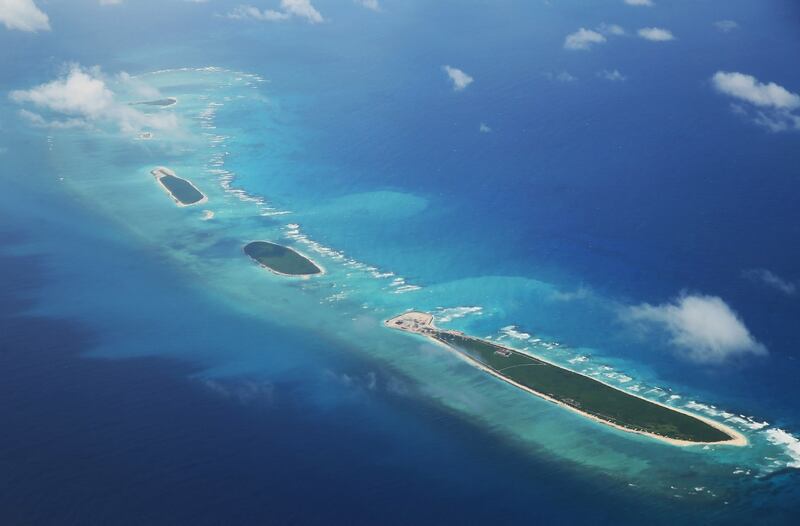Manila on Friday joined Hanoi to denounce an alleged Chinese attack on a Vietnamese fishing boat in the South China Sea, saying such violence had no place in territorial disputes that embroil several countries.
Vietnamese state media accused Chinese law enforcement personnel of boarding the fishing boat in the Paracel Islands and assaulting the crew last Sunday. But China denied that its forces had used a heavy-handed approach to stopping Vietnamese boats from operating in waters claimed by both countries.
The Chinese personnel beat the crew with iron bars, seriously injuring at least four sailors, Vietnamese state media reported. The personnel also allegedly smashed the fishing equipment and took away the crew's catch.
Manila, which also has territorial claims in the waterway that overlap with those of Beijing and Hanoi, called it a “serious incident” and urged all parties to use restraint.
Manila “underscores the need for disputes in the (South China Sea) to be managed peacefully and in accordance with international law,” particularly the United Nations Convention on the Law of the Sea (UNCLOS), its foreign office said in a statement Friday.
“It is a paramount obligation to ensure the safety at sea of vessels and their crew, especially fisherfolk.”

Philippine National Security Adviser Eduardo Año also condemned what he described as China’s violent and illegal action against Vietnam in the Sept. 29 incident at sea.
“Fishermen, as vulnerable maritime workers, deserve protection, not harm, at sea,” he said in a statement.
Año warned that China’s action had escalated tensions in an already volatile maritime region and that the Philippines, as a claimant country, was advocating a peaceful resolution to the conflict.
Earlier, Vietnam’s foreign ministry denounced what it called “the brutal treatment” by Chinese law enforcement forces of Vietnamese fishermen and foreign fishing boats in the area.
China’s Embassy in Manila did not immediately provide comment.
On Tuesday, China told the Reuters news agency that its personnel had stopped Vietnamese fishing boats from illegally fishing in the waters claimed by both countries. "The on-site operations were professional and restrained, and no injuries were found," Beijing said.
Hanoi-Manila ties
Although the Philippines and Vietnam have overlapping claims in the waterway, they are on good diplomatic terms and have been working together to manage their respective claims.
In August, the Philippines and Vietnam agreed to sign a memorandum on defense cooperation that would see them strengthen their joint activities at sea. Their coastguards also conducted their first joint exercises that month.
The Philippines and China have been locked in their own bilateral conflict over the South China Sea, with Manila accusing Beijing of repeatedly harassing its boats in the Philippine exclusive economic zone.
RELATED STORIES
[ EXPLAINED: What are the Paracel Islands and why are they disputed?Opens in new window ]
[ China denies injuring ‘illegal’ Vietnamese fishing crewOpens in new window ]
[ Vietnam says China attacked fishing boat near disputed islandsOpens in new window ]
In response to Sunday’s incident, the United States urged China to stop its “dangerous and destabilizing” activities in the disputed waters.
"The United States is deeply concerned by reports of dangerous actions by [Chinese] law enforcement vessels against Vietnamese fishing vessels around the Paracel Islands on September 29," U.S. State Department spokesman Matthew Miller posted on X (Twitter) Thursday.
Simmering tensions
The Paracel Islands consist of some 130 reefs and small coral islands and are located 250 miles (400 km) east of central Vietnam and 220 miles (350 km) southeast of China's Hainan island. Known as Xisha in China and Hoang Sa in Vietnam, the islands are believed to sit atop large reserves of natural gas and oil.
Since 1974, China has maintained de facto control over the islands, which are also claimed by Vietnam and Taiwan.

The South China Sea, a waterway considered vital to world trade, is claimed almost entirely by China. The sea is also claimed by the Philippines, Vietnam, Brunei, Malaysia, and Taiwan.
Political analysts say the waterway is a potential tinderbox for war breaking out in the region, if the overlapping claims are not managed.
Manila’s support for Hanoi at this critical stage shows their common stand against Beijing’s “belligerent actions” in the troubled waterway, said Sherwin Ona, who lectures at the De La Salle University’s political science department in Manila.
The public needs to realize that China has also actively beefed up its presence in Malaysia’s exclusive economic zone while continuing to penetrate the maritime zones of Taiwan and Japan in the East China Sea, he told BenarNews. “This points to a deliberate effort to really challenge the status quo of the region.”
Like-minded countries, Ona said, should boost their “legal positions by addressing illegal and unregulated fishing and resolve overlaps in maritime domains.”
BenarNews is an RFA-affiliated online news organization.
